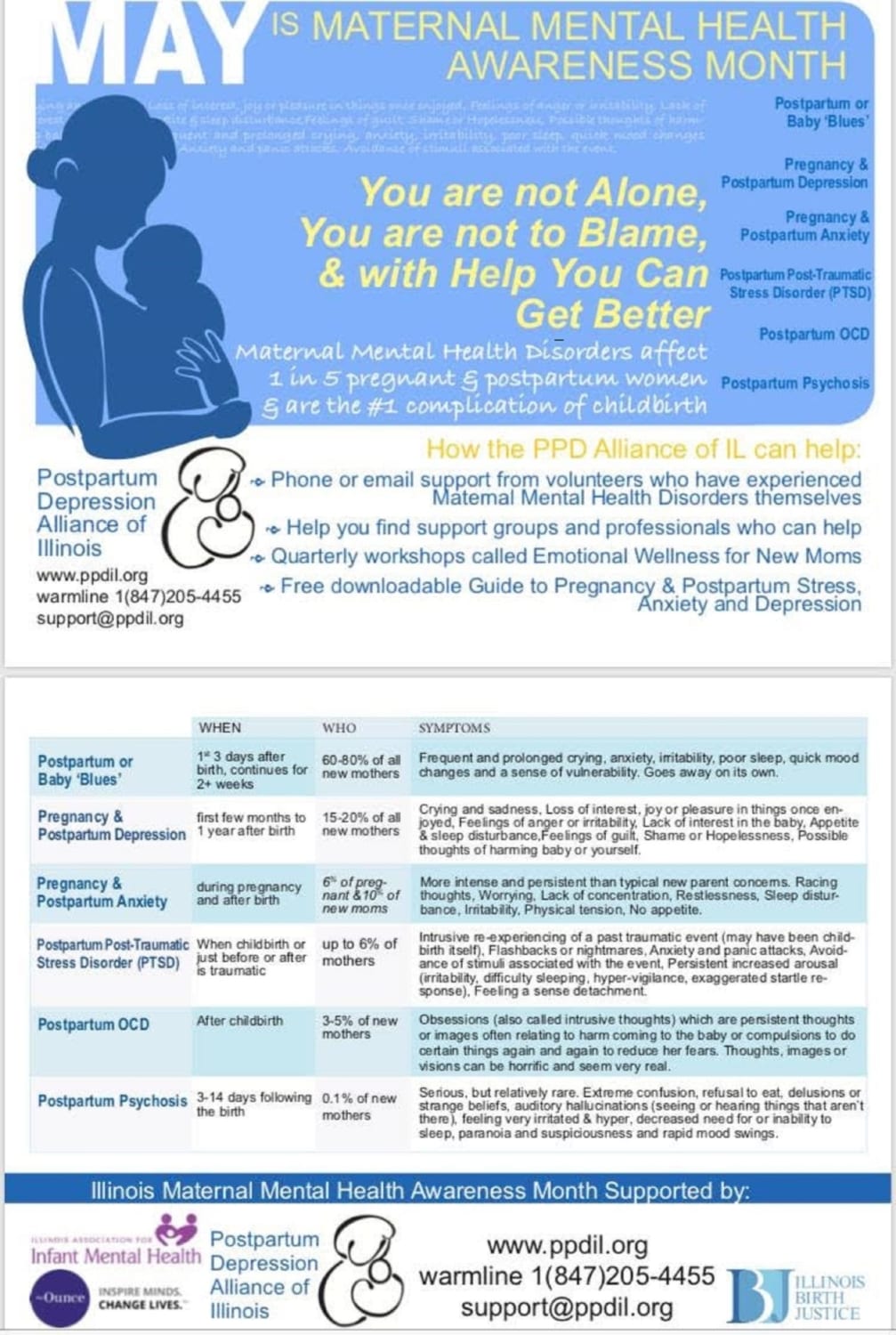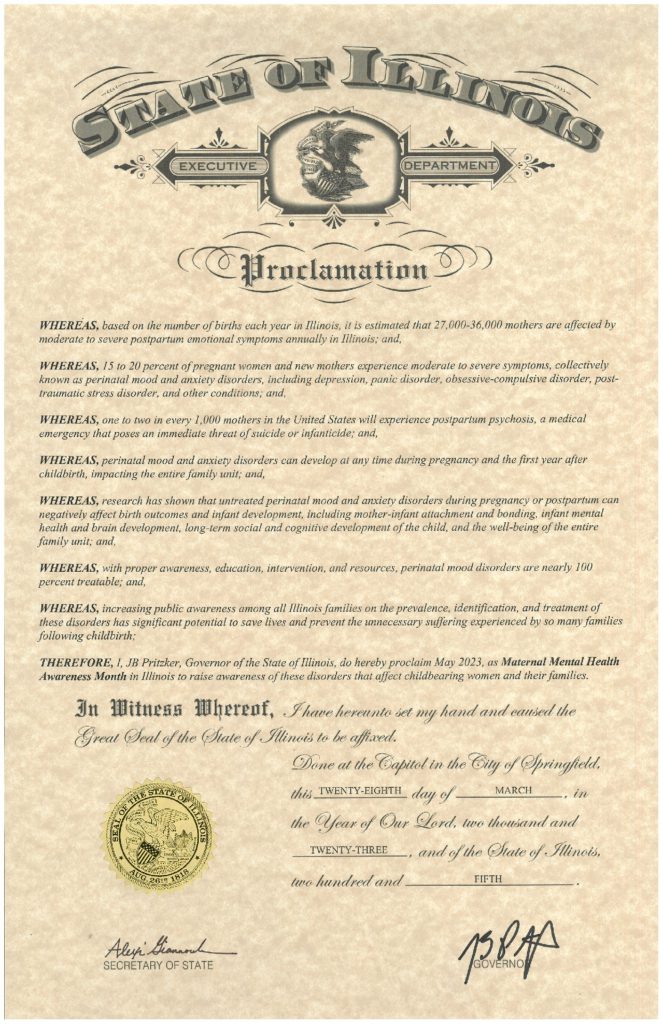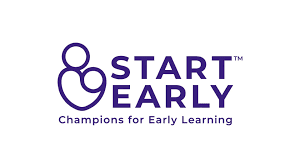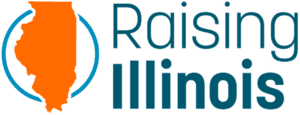MAY – MATERNAL MENTAL HEALTH AWARENESS MONTH
The Postpartum Depression Alliance of Illinois (PPD IL) has worked with Illinois Governors for the past 20 years in order to have May proclaimed Maternal Mental Health Awareness Month in Illinois. We use this month to bring increased public awareness to the prevalence, symptoms and effects perinatal mood disorders can have on women and their families
We also hope that health professionals, hospitals and treatment centers will use the month to promote awareness about maternal mental health issues in their communities.
PRESS RELEASE ABOUT MATERNAL MENTAL HEALTH AWARENESS MONTH
GOVERNOR PRITZKER PROCLAIMS MAY MATERNAL MENTAL HEALTH DISORDERS AWARENESS MONTH IN ILLINOIS.
Contact: Dr. Sarah Allen, Director of the Postpartum Depression Alliance of Illinois:
847 791 -7722 or email her via Dr. Allen’s Contact Form
Chicago, Illinois — Illinois Governor Pritzker is proclaiming May Maternal Mental Health Awareness Month in order to raise awareness of the common illness experienced by moms and moms-to-be.
Here in Illinois, the Postpartum Depression Illinois Alliance (PPD IL) works to promote awareness, prevention and treatment of maternal mental health issues throughout the state. PPD IL offers a helpline (847-205-4455) and website (www.PPDil.org) for women and their families so they can learn more about pregnancy & postpartum mood disorders and access local resources such as support groups and trained healthcare providers.
Dr. Sarah Allen, director of the PPD Alliance of Illinois says they are choosing May, as it is home to Mother’s Day, to educate women and their families and friends about the nature of this illness. Approximately 15% of pregnant women and 15% – 20% of new mothers experience major or minor depression in the first year after giving birth. Methodological differences among the studies make the actual prevalence rate unclear. Also, this are statistics from women reporting how they feel, the actual number is probably much higher.
Symptoms differ for everyone but may include:
- Many worries and panic attacks
- Feelings of sadness, fear, anger and guilt
- Possible thoughts of harming the baby or oneself
- Lack of interest in the baby
- Appetite & Sleep Disturbance
- Difficulty concentrating and making decisions
Ireta Gasner, vice president of Illinois Policy at Start Early understands the importance of raising awareness, prevention and treatment of maternal health issues. “We continue to celebrate the decision to recognize May as Maternal Mental Health Awareness Month. Positive maternal mental health plays a critical role in fostering healthy parent-child attachments,” Gasner said. “And, a securely attached child demonstrates curiosity, willingness to explore, pleasure in learning and independence. Birthing persons have a range of experiences after giving birth and a perinatal mood and anxiety disorder does not define someone’s ability to be a good parent and care for their child. We hope increased awareness will reduce stigma and work towards addressing inequities in maternal and child health and mortality. We hope it will help new parents identify symptoms, seek assistance and gain access to the support and interventions they need.”
Symptoms of depression and anxiety occur in up to 20% of expectant and new moms, making these the most common complication of pregnancy, affecting nearly 1 million women every year in the United States alone. These emotional disorders cover a wide spectrum, including pregnancy depression and anxiety, postpartum depression, postpartum anxiety, postpartum obsessive-compulsive disorder, postpartum post-traumatic stress disorder and postpartum psychosis. Yet despite their prevalence, perinatal mood and anxiety disorders are under-detected by health care professionals and many women go without treatment.
Theresa Atchley, President of the Illinois Association for Infant Mental Health (ILAIMH), stated “We must all work to champion and support the healthy social and emotional development of infants and young children. This requires us to prioritize the social and emotional health of parents of infants, beginning from pregnancy and continuing through the critical early years. For professionals working in systems of care with infants, young children, and their families, it is necessary that we support the caregivers in successfully accessing mental health services whenever there may be a need. Perinatal mood disorders are highly responsive to medical and social interventions and can make all the difference in strengthening the lives of parents and their babies.”
“We want women to realize that they are not alone, they are not to blame and with help, you can be well again”, said Dr. Sarah Allen, Director PPD IL Alliance.
For more information about pregnancy & postpartum mood disorders & Maternal Mental Health Awareness Month contact: Dr. Sarah Allen, Director IL PPD Alliance at 847 791 -7722 or Email Dr. Allen.








